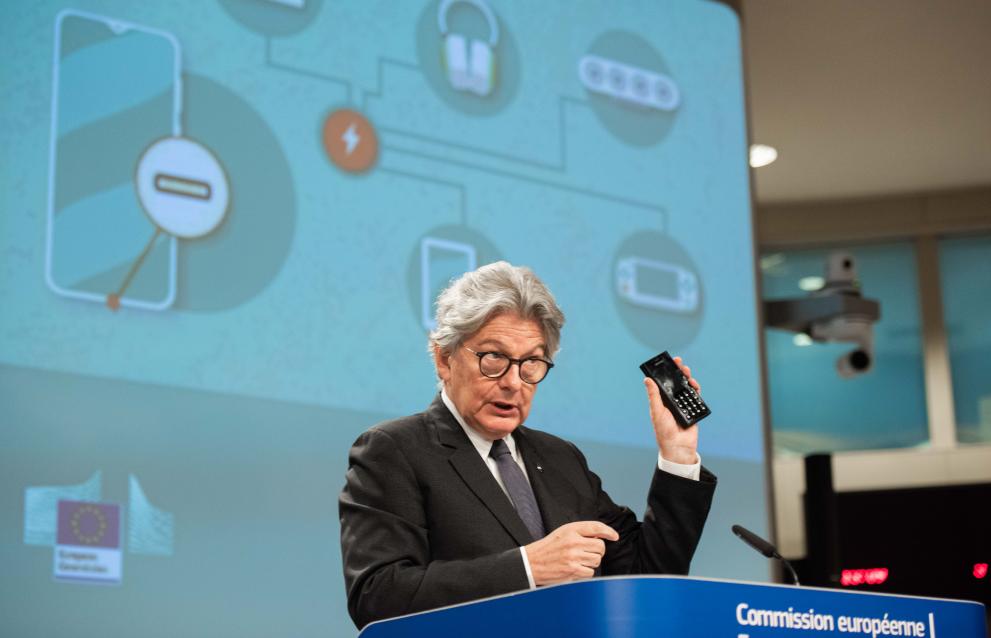
As of 2024, all new handheld mobile phones, tablets, digital cameras, handheld videogame consoles, headphones, headsets, portable speakers, e-readers, keyboards, mice, portable navigation systems, and earbuds will have to be equipped with a USB-C charging port. The deadline for laptops is 2026.
Leveraging the power of the Single Market, these new and long-awaited rules will bring resource and CO2 savings while allowing technological innovation.
Margrethe Vestager, Executive Vice-President for a Europe fit for the Digital Age, said: “No more bundles of different chargers in our drawers. One common charger is a real benefit to us as consumers. It will also help our environment. So we welcome today's agreement of the common charger following a swift conclusion of negotiations between the co-legislators.”
Thierry Breton, Commissioner responsible for the Internal Market, said: “A common charger is common sense for the many electronic devices on our daily lives. Thanks to our strong political commitment, we found an agreement in less than 9 months. European consumers will be able to use a single charger for all their portable electronics – an important step to increase convenience and reduce waste. The deal we struck this morning will bring around 250 million euros of savings to consumers annually. It will also allow new technologies such as wireless charging to emerge and to mature without letting innovation to become source of market fragmentation and consumer inconvenience.”
Today's agreement reached by the co-legislators confirms and extends the Commission's proposal:
• The charging port and fast charging technology will be harmonised: first, USB-C will be the common port. This will allow consumers to charge their devices with the same USB-C charger, regardless of the device brand. At the same time, harmonising fast charging technology will help prevent that different producers unjustifiably limit the charging speed and will help to ensure that charging speed is the same when using any compatible charger for a device. These rules will now apply to a range of electronic devices mentioned above. More devices may be included in the future following regular assessment of the market by the Commission.
• Unbundling the sale of a charger from the sale of the electronic device: consumers will be able to purchase a new electronic device without a new charger. This will limit the number of unwanted chargers purchased or left unused. The results produced and the possible extension of the measure to the cable will be assessed in the course of the implementation.
• Improved information for consumers: producers will need to provide relevant information about charging performance, including information on the power required by the device and if it supports fast charging. This will make it easier for consumers to see if their existing chargers meet the requirements of their new device or help them to select a compatible charger.
• Setting the way for harmonised wireless charging solutions: since the technology is evolving rapidly and in order to limit a potential future fragmentation of the market, the Commission will assess the different technologies available in view of a possible future harmonisation, and will request to European Standardisation Organisations that the appropriate solution is translated into a harmonised standard.
The agreement reached today also ensures that the common charger solutions can be implemented without delay, especially given the widely available technological solutions and ample time already given to industry to adapt. A transition period of 24 months from official adoption is therefore established to make the common charger a reality for everyone for all categories of products in scope except for laptops which will benefit from 40 months.
Background
In 2020, approximately 420 million mobile phones and other portable electronic devices were sold in the EU. However, due to incompatible chargers on the market more than a third of consumers report having experiencing problems, while spending approximately €2.4 billion annually on additional standalone chargers. At the same time, disposed of and unused chargers contribute to around 11,000 tonnes of e-waste every year.
The Commission has supported a common charging solution for mobile phones and similar electronic devices since 2009. While years of working with industry on a voluntary approach helped to bring down the number of mobile phone chargers from 30 to 3 within the last decade, this approach did not allow achieve the full harmonisation. With regards to the unbundling of chargers, there was currently no legal basis to frame such a practice. Since it delivers significant environmental benefits, it is important to complement the harmonisation of the charging receptacle. Additionally, the harmonisation of the charging protocol ensures that both provisions guarantee the full interoperability and retrieve the biggest benefits for consumers and the environment. Those benefits will be enhanced by the broadening of the list of categories of products covered. With regards to wireless charging, the Commission will monitor the evolution of the technologies and market dynamic with the objective of introducing a future harmonisation.
For More Information
Press release on the Commission's proposal on a common charging solution for electronic devices
Factsheet on the Commission's proposal on a common charging solution for electronic devices
Follow @EU_Growth on Twitter
Details
- Publication date
- 7 June 2022
- Author
- Representation in Cyprus
